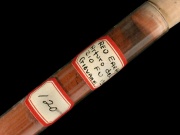Difference between revisions of "Red iron oxide"
m (Text replace - "\[http:\/\/cameo\.mfa\.org\/materials\/fullrecord\.asp\?name=([^\s]+)\s(.*)\]" to "$2") |
|||
| Line 19: | Line 19: | ||
== Comparisons == | == Comparisons == | ||
| − | [[media: | + | [[media:download_file_209.pdf|Properties of Common Abrasives]] |
| − | |||
| − | |||
== Sources Checked for Data in Record == | == Sources Checked for Data in Record == | ||
Revision as of 13:31, 30 May 2020
Description
Turned off - same as iron oxide red- Iron oxides, in hydrated and anhydrous forms, produce a wide variety of red shades ranging from light, bright red to a deep purplish red. They can be natural, earth pigments (Hematite, Indian red, Venetian red) or synthetically prepared pigments (Light red). All iron oxide reds are stable, permanent pigments with good tinting strength. Iron oxides generally provide the color in ochers and siennas.
Synonyms and Related Terms
red iron oxide; red ocher; red ochre; haematite; hematite; Indian red; caput mortum; rouge; Persian red;Tuscan red, Pompeian red; light red; Venetian red; terra Pozzuoli; English red; pozzuolana, terra di Pozzuoli; bengara (Jap.); benigara (Jap.); Roter Ocker (Deut.)
| Mohs Hardness | 5.5 - 6.5 |
|---|---|
| Density | 4.2-5.3 |
Comparisons
Properties of Common Abrasives
Sources Checked for Data in Record
- Ralph Mayer, A Dictionary of Art Terms and Techniques, Harper and Row Publishers, New York, 1969 (also 1945 printing)
- Website address 1 Comment: Pigments Through the Ages - http://webexhibits.org/pigments/indiv/overview/redochre.html
- R.Feller, M.Curran, C.Bailie, 'Identification of Traditional Organic Colorants Employed in Japanese Prints and Determination of their Rates of Fading', Japanese Woodblock Prints, Allen Memorial Art Museum, Oberlin College, Oberlin, 1984
